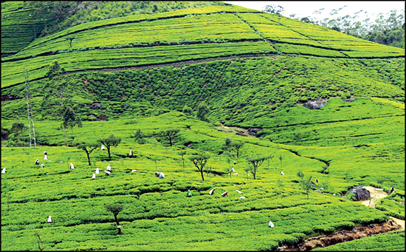|
Tea exporters urge:
Make Lanka a global hub
by Gamini WARUSHAMANA
A fundamental shift in the global tea trade is threatening the strong
position of the Ceylon Tea in the global market, the Tea Exporters
Association warned.
The chairman of the Tea Exporters Association Jayantha Keragala said
that this new trend has posed a great threat to the tea industry and
Ceylon Tea will lose its global image and will end up as a bulk tea
supplier to Dubai if immediate measures are not taken. He urged the
policy-makers to pay attention to this matter.
 Keragala said that this new trend emerged after the global economic
crisis, where the tea prices dropped sharply. Since May the prices have
started to pick up again. In June and July prices gained and in August
and September the prices recovered to the pre-crisis high level. Keragala said that this new trend emerged after the global economic
crisis, where the tea prices dropped sharply. Since May the prices have
started to pick up again. In June and July prices gained and in August
and September the prices recovered to the pre-crisis high level.
However, Russia and Iran the buyers in our main markets requested a
price reduction. Meanwhile, most of the major tea brands relocated their
operations. Due to this reason 630 tea bag machines in Sri Lanka found
it difficult to get orders to meet the capacity, he said.
He said, that there are several factors behind this crisis. The main
reason is Dubai emerging as the main hub of the tea trade.
Today Dubai has offered lot of concessions to tea blending and
packing industries including free storage facility for 2-3 months, low
rent and credit facilities at 3-4% low rate. Therefore, many global
brands are now shifting to Dubai. For instance the brand leader Unilever
has relocated its entire operations in tea bagging in Jabel Ali, Dubai
and this is being used as a role model by many other brands.
They have started to bring tea in bulk form all over the world,
Vietnam, India, Sri Lanka and Kenya and add value in Dubai.
The high price of Ceylon Tea is another factor and today major brands
have started to blend Ceylon Tea with other origins.
Keragala said that the price difference of high quality Ceylon Tea
and Vietnam Tea is around US$ 1-1.5/kg. After the global economic crisis
price has become a main concern of the consumers and therefore major
brands have started to blend Ceylon tea with tea from other origins and
market as Ceylon Tea. This gives many advantages to the brand tea
suppliers including, low cost, low tax, low transport cost and resulting
high margins.
The other reason is, over time, this century old traditional trade
has been changing. The major brands that dominate the global market is
in the hands of a few families or few old companies since long years.
However, the new generation of these traders who are educated in
Europe or the US have modernised the trading concepts falling in line
with new trends.
The creation of tea trade hub in Dubai is a result of that. As a
major tea producing country we have failed to realise these new trends
and respond positively, he said.
On the other hand the plantation sector should get ready to face
these new challenges. The sustainability of the industry should be
ensured by addressing the issues such as re-planting and fertiliser
usage. Some up country estate companies are shifting from tea to
vegetables and other crops.
The production is volatile with the climate changes. Meanwhile
Vietnam is emerging as a competitor and Vietnam tea is becoming popular.
Sri Lankan planters are now working in these Vietnam estates and they
provide the expertise in the industry.
Our export share ($1.2 billion) is around 4% of the global tea
exports ($25 billion). We annually export around 320 million kg of tea
and of them 45% is value added tea. We add around 25% value in the
country and with the new crisis now we have to stop this value addition
and export in bulk.
This will affect the employment of thousands. On the other hand now
it is becoming attractive for Sri Lankan tea exporters to set up packing
and blending facilities in Dubai. If the authorities fail to reverse the
trend by radical changes in this industry all our exporters will shift
their processing facilities to Dubai. Because we have only 12% of Sri
Lankan brands and most of our exports are shipped under dominant global
brands, he said. To reverse the trend Keragala proposes to make Sri
Lanka the global hub in the tea trade. For this, he said, radical
changes have to be introduced which would conflict with our traditional
views. We should allow tea imports, blending, value addition and
re-export. The plantation sector strongly opposed tea imports but today
the situation has completely changed. Sri Lanka should be the global hub
in tea trade and we have all qualifications for that. Unless we start
this effort today the industry would suffer severely, he said.
|

